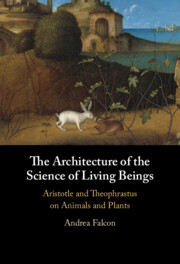The Architecture of the Science of Living Beings
Scholars have paid ample attention to Aristotle’s works on animals. By contrast, they have paid little or no attention to Theophrastus’s writings on plants. That is unfortunate because there was a shared research project in the early Peripatos that amounted to a systematic, and theoretically motivated, study of perishable living beings (animals and plants). This is the first sustained attempt to explore how Aristotle and Theophrastus envisioned this study, with attention focused primarily on its deep structure. That entails giving full consideration to a few transitional passages where Aristotle and Theophrastus offer their own description of what they are trying to do. What emerges is a novel, sophisticated, and largely idiosyncratic approach to the topic of life.
Andrea Falcon is Professor Emeritus at Concordia University, Montreal and currently lecturing at the University of Milan. He is the author, editor, and coeditor of many books, with his two most recent coedited books on Aristotle being Aristotle’s De incessu animalium (Cambridge University Press, 2021) and Aristotle’s Generation and Corruption II (Cambridge University Press, 2022).

